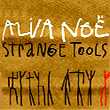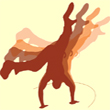Wednesday, 13 May 2015
Preserving Our Bodies and Minds from the Ills of Civilization

For several hundreds of thousands of years, human beings lived and evolved in small groups of hunter-gatherers whose environment was the natural world. It is only for the past 10,000 years or so that we have lived first in villages, and then in cities. Today, a large proportion of us live in megalopolises and work in factories or offices where we have little contact with nature. And what is worse, our contacts with one another are becoming more and more virtual, and our emotional bonds weaker and weaker.
Thus, over what is a very short timespan from an evolutionary standpoint, the human body and the human brain, shaped by a natural environment very different from our own, have had to adapt to a very radical change in environment. And, it would seem, the further our urban way of life departs from the ways of our hunter-gatherer ancestors, the more our physical and mental health suffers.
That is the argument made by John Ratey, co-author of the book Go Wild: Free Your Body and Mind from the Afflictions of Civilization, in an interview by Ginger Campbell in the last episode of his podcast Books and Ideas. (more…)
Body Movement and the Brain | Comments Closed
Monday, 10 September 2012
Why You Are Not Just Your Brain
 In the introduction to their 1991 book The Embodied Mind, Francisco Varela, Evan Thompson, and Eleanor Rosch noted that as of that writing, the cognitive sciences had little to say about what it means to be human in the concrete situations of everyday life. This criticism was aimed directly at the prevailing paradigm, according to which the human brain worked somewhat like a computer, with input, information processing, symbolic representation, output, and so on.
In the introduction to their 1991 book The Embodied Mind, Francisco Varela, Evan Thompson, and Eleanor Rosch noted that as of that writing, the cognitive sciences had little to say about what it means to be human in the concrete situations of everyday life. This criticism was aimed directly at the prevailing paradigm, according to which the human brain worked somewhat like a computer, with input, information processing, symbolic representation, output, and so on.
In contrast, the approach proposed by Varela and his colleagues, to which they gave the name “enaction”, emphasizes how much our reasoning depends on our bodies and on the environmental context in which they are situated. (more…)
Body Movement and the Brain, The Emergence of Consciousness | Comments Closed
Monday, 6 August 2012
Our Mirror Neurons Prefer the Movements We’ve Already Learned
 Often I use this blog to talk about the latest studies in neuroscience. But this week I want to talk about a study that was conducted a few years back, because it provides a good introduction to the brain cells known as mirror neurons, which are often described as strange entities indeed.
Often I use this blog to talk about the latest studies in neuroscience. But this week I want to talk about a study that was conducted a few years back, because it provides a good introduction to the brain cells known as mirror neurons, which are often described as strange entities indeed.
Mirror neurons were first identified in the motor area of the frontal cortex of monkeys, by Italian neurophysiologist Giacomo Rizzolatti, in the early 1990s. Rizzolatti discovered that these particular neurons became activated not only when monkeys made a hand gesture or a facial expression (as is normal for motor neurons), but also when monkeys watched other monkeys doing so, without making the gesture or expression themselves (hence the name “mirror neurons”). (more…)
Body Movement and the Brain | 2 comments »







